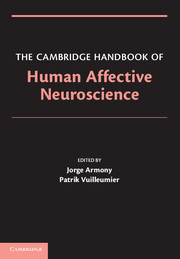Book contents
- The Cambridge Handbook of Human Affective Neuroscience
- The Cambridge Handbook of Human Affective Neuroscience
- Copyright page
- Dedication
- Contents
- List of Contributors
- Introduction
- Section I Introduction to Human Affective Neuroscience
- Section II Measuring Emotional Responses
- Section III Emotion Perception and Elicitation
- Section IV Cognitive-Emotion Interactions
- Chapter 14 Affective Biases in Attention and Perception
- Chapter 15 Top-Down Attention and the Processing of Emotional Stimuli
- Chapter 16 EmotionRegulation
- Chapter 17 NeuralMechanisms Underlying Value-Based Decision Making
- Section V Emotional Learning and Memory
- Section VI Social Emotions
- Section VII Individual Differences in Emotion
- Index
Chapter 15 - Top-Down Attention and the Processing of Emotional Stimuli
from Section IV - Cognitive-Emotion Interactions
Published online by Cambridge University Press: 05 February 2013
- The Cambridge Handbook of Human Affective Neuroscience
- The Cambridge Handbook of Human Affective Neuroscience
- Copyright page
- Dedication
- Contents
- List of Contributors
- Introduction
- Section I Introduction to Human Affective Neuroscience
- Section II Measuring Emotional Responses
- Section III Emotion Perception and Elicitation
- Section IV Cognitive-Emotion Interactions
- Chapter 14 Affective Biases in Attention and Perception
- Chapter 15 Top-Down Attention and the Processing of Emotional Stimuli
- Chapter 16 EmotionRegulation
- Chapter 17 NeuralMechanisms Underlying Value-Based Decision Making
- Section V Emotional Learning and Memory
- Section VI Social Emotions
- Section VII Individual Differences in Emotion
- Index
Summary
Keywords
- Type
- Chapter
- Information
- The Cambridge Handbook of Human Affective Neuroscience , pp. 357 - 374Publisher: Cambridge University PressPrint publication year: 2013
- 12
- Cited by

